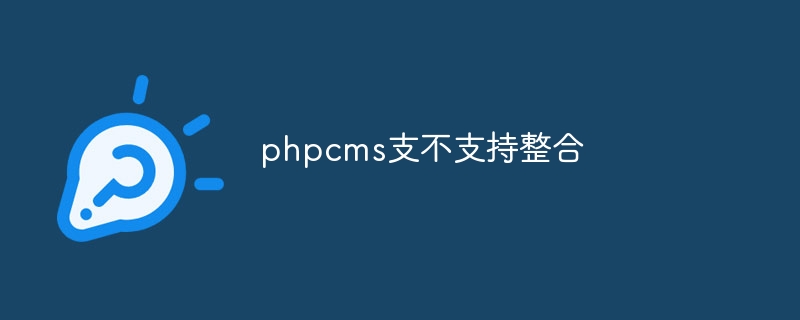
phpcms supports integration. It has a flexible architecture and rich extension mechanisms, making it very easy to integrate with other systems. Whether it is a personal website or a corporate portal, it can be integrated through phpcms to obtain better user experience and management effects.

The operating system of this tutorial: Windows 10 system, PHPcms version 9.6.0, Dell G3 computer.
phpcms is an open source content management system that provides powerful functions for managing and publishing content. But one question that many users may be concerned about is whether phpcms supports integration with other systems.
The answer to this question is yes.
phpcms has a flexible architecture and rich extension mechanisms, making it very easy to integrate with other systems. Whether it is with CMS system, e-commerce system or enterprise resource planning (ERP) system, phpcms can be seamlessly connected.
First of all, phpcms supports integration with mainstream CMS systems. Whether it is WordPress, Joomla or Drupal, they can all be integrated through the interface provided by phpcms. This allows users to obtain the powerful content management functions of phpcms without changing the original website framework. Through this integration, users can add more flexible and powerful content management functions based on the original cms system.
Secondly, phpcms also supports integration with e-commerce systems. Whether it is Magento, PrestaShop or OpenCart, it can be integrated with phpcms. Through this integration, users can organically combine the content management functions of phpcms with the shopping functions of the e-commerce system. In this way, users can display product information and related articles on the website at the same time, providing more comprehensive and detailed services.
In addition, phpcms also supports integration with enterprise resource planning (ERP) systems. Whether it is SAP, Oracle or Microsoft Dynamics, it can be integrated with phpcms. Through such integration, users can use the ERP system to manage and process business data within the company, and then display relevant information on the website through phpcms. In this way, users can achieve integrated management of information inside and outside the company.
In short, phpcms not only has powerful content management functions, but also has the flexibility to integrate with other systems. By integrating with mainstream CMS systems, e-commerce systems and enterprise resource planning systems, phpcms can provide users with more comprehensive and integrated solutions. This allows users to obtain rich online services and functions without changing the original system framework. As an open source content management system, the integration capabilities of phpcms bring more choices and possibilities to users. Whether it is a personal website or a corporate portal, it can be integrated through phpcms to obtain better user experience and management effects.
The above is the detailed content of phpcms support does not support integration. For more information, please follow other related articles on the PHP Chinese website!
 Vue parent component calls the method of child component
Vue parent component calls the method of child component
 What is digital currency trading
What is digital currency trading
 How to use fusioncharts.js
How to use fusioncharts.js
 length function usage
length function usage
 Cost-effectiveness analysis of learning python, java and c++
Cost-effectiveness analysis of learning python, java and c++
 Representation method of string constant
Representation method of string constant
 mysql transaction isolation level
mysql transaction isolation level
 How to open .dat files
How to open .dat files
 how to build a website
how to build a website